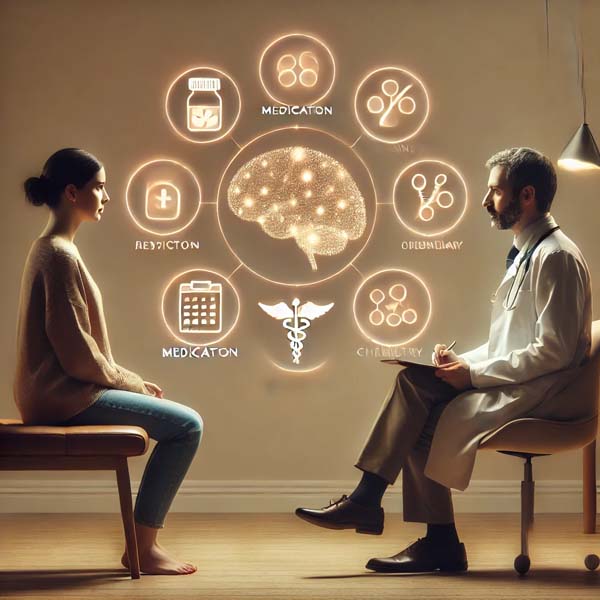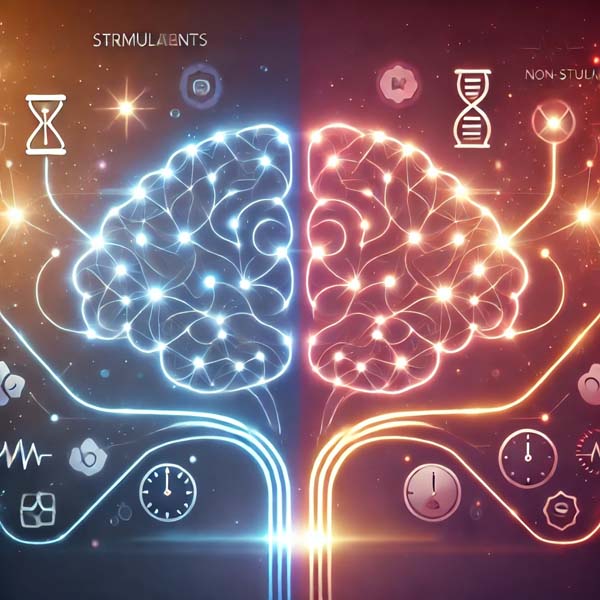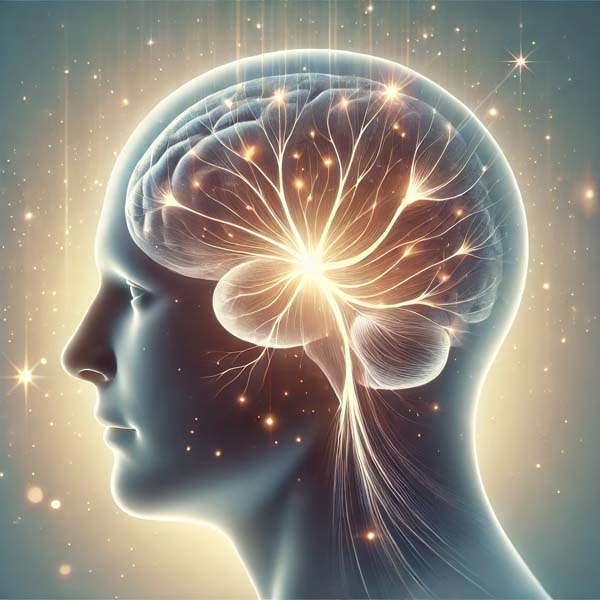
💊 Pharmacological Interventions for Adult ADHD
A shared approach to safe, personalised, and evidence-based care
Medication can play an important role in helping adults with ADHD regain focus, manage impulsivity, and improve daily functioning. At ADHD Life Guide, we take a thoughtful, collaborative approach to prescribing — balancing medical safety with what matters most to you.
$300
Your personalised treatment journey begins here
During your prescribing appointment, we will:
- Confirm your diagnosis and discuss the role of medication in managing your ADHD
- Choose a suitable medication based on your symptoms, health history, and preferences
- Review PBS eligibility and available formulations
- Discuss the expected benefits, side effects, and how the medication works
- Establish a follow-up plan for titration and monitoring
📝 Please read the Consumer Medicine Information (CMI) provided with your medication — it contains important information about how to take it safely, what side effects to watch for, and when to seek help.

💊 Medication Options
Choosing the right ADHD medication is a personalised process. What works well for one person might not be ideal for another, which is why we take time to match your treatment to your unique brain chemistry, lifestyle, and medical history.
We offer both stimulant and non-stimulant medications, based on clinical guidelines and your individual needs.
✅ Stimulant Medications
Stimulants are usually the first-line treatment for ADHD and are supported by the strongest evidence base. They work quickly by increasing dopamine and norepinephrine levels in the brain, which helps improve focus, reduce impulsivity, and enhance task persistence.
~ Methylphenidate: Ritalin, Ritalin LA, Concerta
~ Dexamfetamine: Adderal
~ Lisdexamfetamine: Vyvanse
✅ Non-Stimulant Medications
Non-stimulants may be used when stimulants are not well tolerated or contraindicated, or as an additional support alongside them. These medications tend to work more gradually and are often preferred for individuals with co-occurring anxiety, sleep difficulties, or cardiovascular concerns.
~ Atomoxetine (Strattera)
~ Guanfacine (Intuniv – off-label use in adults)
~ Clonidine (off-label, especially for sleep, aggression, or emotional dysregulation)
🧾 PBS Guidance
- Vyvanse and Ritalin LA can only be prescribed on the PBS if a retrospective diagnosis of ADHD is documented
- Concerta is only PBS-subsidised if the ADHD diagnosis was made before age 18
- Non-stimulants like atomoxetine, guanfacine, and clonidine are typically prescribed off-label in adults and may not be covered under PBS

⚙️ How ADHD Medications Work
Targeting brain chemistry to strengthen attention, motivation, and self-regulation
ADHD is a neurodevelopmental condition that primarily affects the prefrontal cortex — the part of the brain located just behind the forehead, responsible for executive functions like attention control, emotional regulation, decision-making, time management, and working memory.
In individuals with ADHD, the frontal lobe circuitry is underactive, particularly in the networks that regulate dopamine and norepinephrine, two key neurotransmitters that help the brain stay alert, filter distractions, and sustain focus over time.
This means the basic issue in ADHD is not a lack of willpower — it’s a brain-level difficulty in efficiently activating and maintaining attention and behavioural control, especially in tasks that are not immediately stimulating or emotionally engaging.

🌟 Expected Benefits
- Improved ability to focus and complete tasks
- Less distractibility and restlessness
- Reduced emotional reactivity and impulsive decisions
- Calmer energy and better task follow-through
⏱️ Stimulants may work within hours
🕒 Non-stimulants may take 2–6 weeks to reach full effect

🧪 What Medications Aim to Do
Most ADHD medications are designed to correct this underlying imbalance by improving the signalling of dopamine and norepinephrine within the prefrontal cortex. This helps the brain:
- Tune in to the task at hand
- Filter out distractions
- Pause before acting impulsively
- Sustain motivation and manage time more effectively
✅ Stimulant Medications
Stimulants (e.g. methylphenidate, lisdexamfetamine) quickly increase the availability of dopamine and norepinephrine by either:
- Blocking their reuptake (so they stay active in the brain longer), or
- Promoting their release from nerve terminals
This results in a faster transmission of neural signals in areas of the brain that regulate attention, impulse control, and planning — often improving focus within hours of the first dose.
🕒 Non-Stimulant Medications
Non-stimulants (e.g. atomoxetine, guanfacine, clonidine) work more gradually, adjusting the same neurotransmitter systems but through more indirect mechanisms. While they may take longer to show full effects (2–6 weeks), they are often better tolerated by individuals with anxiety or sleep difficulties, or those with contraindications to stimulants.
⚠️ Common Side Effects
Most are manageable — some need attention
Stimulants:
- Appetite suppression
- Insomnia
- Headache or dry mouth
- Increased heart rate
- Increased blood pressure
- Emotional reactivity or irritability
- Rarely: motor tics, rebound symptoms, or agitation
Non-Stimulants:
- Nausea, dizziness
- Low energy or fatigue
- Delayed onset of therapeutic effect
- Mood changes (in rare cases)
🚫 Contraindications
Stimulants are not recommended if you have:
- Glaucoma
- Thyrotoxicosis
- Arrhythmias or uncontrolled hypertension
- Active angina or cardiovascular disease
- Bipolar disorder or a history of psychosis
- Anorexia nervosa or significant substance use history
In such cases, we may explore non-stimulant options or focus on lifestyle and coaching interventions.
🧠 Interaction
Many adults with ADHD also take antidepressants such as:
# SSRIs (e.g. sertraline, fluoxetine)
# SNRIs (e.g. venlafaxine, duloxetine)
These can be safely combined with ADHD medication, but:
There is a small risk of increased agitation or interaction effects
We will monitor closely for mood instability, sleep issues, or heightened anxiety
Always let us know about any changes in your mental state or physical symptoms.
⚠️ Important Safety Notice: When to Seek Immediate Help
While most people tolerate ADHD medication well, rare but serious side effects can occur. It is very important to monitor for:
- Psychotic symptoms such as:
- Hearing voices (auditory hallucinations)
- Feeling watched, followed, or persecuted
- Seeing or feeling things that aren’t there (visual or tactile hallucinations)
- Mood changes, especially:
- Sudden bursts of energy or sleeplessness
- Overconfidence or rapid speech
- Feeling unusually “high” or irritable (possible signs of mania)
- Seizures or convulsions, even if you have no past history of seizures
📞 If you experience any of the above symptoms, seek medical help immediately and stop taking the medication until advised.
Please don’t ignore any new or unusual mental or physical experiences. It’s always better to check in — we are here to help keep you safe.
- Psychotic symptoms such as:
Any Questions
We know that starting medication can feel like a big step. Our goal is to walk with you — through questions, doubts, adjustments, and wins — so that whatever path you choose, it’s one you feel confident in.
Mon - Fri: 8AM - 6PM
Sat - Sun: Variable
Brisbane North Medical Specialists,
15 Dallas Parade, Keperra, QLD 4054
(07) 5221 3489
reception@bnms.com.au
